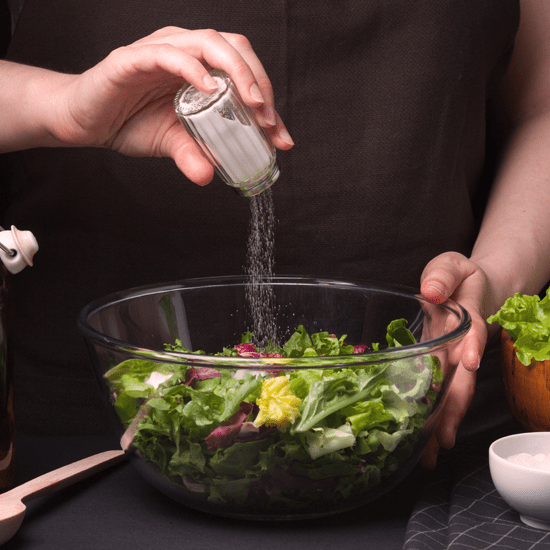
Heart disease remains the number one killer of Americans. Along with poor diet, high cholesterol, diabetes and family history, high blood pressure – also called hypertension – is one of the main risk factors.
Though high blood pressure itself can have many of the same contributors as heart disease, one of the most effective ways to lower it is by reducing your intake of salt, a.k.a. sodium.
Americans eat too much sodium. The American Heart Association recommends no more than 1,500 mg a day – about a teaspoon – but adults currently take in an average of 3,400 mg, more than double what your body needs!
So how can you reduce how much salt you eat (and drink)?
#1: Reduce or avoid:
· Packaged and processed foods, like smoked, salted and canned meats,
· Ham, bacon, hot dogs and lunch meats
· Hard cheeses
· Regular peanut butter
· Canned soups
· Chips and pretzels
· Breads
· Pizza and pasta dishes like lasagna
#2: Read the label:
Be sure to check food labels for total sodium per serving. “No salt added” is a good start but it doesn’t necessarily mean the food is low in sodium – for instance, eggs are naturally high in sodium and milk has a fair amount too.
#3: Make it fresh:
Buying fresh meats, fruits and vegetables give you more control over how much salt – or none at all – you add when cooking. Adding spices like pepper, parsley, cumin, ginger, rosemary, garlic or dill are a great way to add taste to your dishes without adding actual salt.
#4: Reduce portion sizes:
Eating less salt doesn’t necessarily have to mean not eating the foods you love. By reducing portion sizes, you’ll automatically eat less salt. Here’s a handy tip: if you love chips or other salty treats, dole out a small portion in a cup or bowl rather than sitting on your sofa with the whole bag.
#5: Pick potassium:
Sodium and potassium often work in opposite ways in the blood – where sodium raises blood pressure, potassium lowers it. By eating potassium-rich foods like bananas, pomegranates, potatoes, sweet potatoes and white beans you can lower blood pressure naturally. Remember, too high or low amounts of potassium in your diet for prolonged periods can cause muscle weakness, abnormal heart rhythms and kidney disease so be sure to speak to your doctor or a dietitian to learn more.
What are your tips and tricks to reduce sodium in your diet? We’d love to hear from you! Please share your thoughts with the Shop Talk community.

Did you know? A quick tip for eating less salt
Look for packaged food products that have less than 15% of your recommended daily intake of sodium. (Source)
